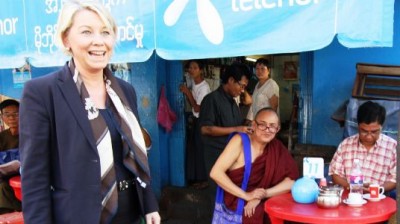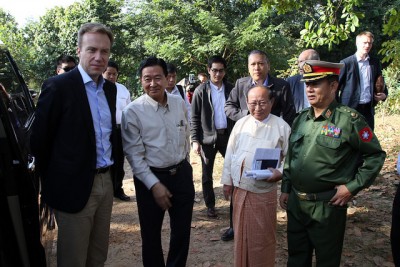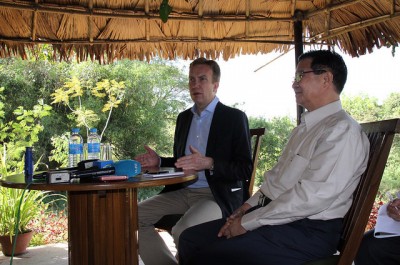Norway’s ongoing financial support for democracy and reform in Myanmar (Burma) has come into question, as a royal entourage from Oslo visited the country this week. Humanitarian organizations worry that Norwegian officials aren’t being tough enough in fighting Myanmar’s child labour, corruption, human rights abuses, religious discrimination and ethnic conflict.

On Monday, Norwegian telecoms firm Telenor was accused of re-defining its own regulations against child labour in order to adapt to local business practice in Myanmar. Telenor won a potentially highly lucrative contract to develop Myanmar’s mobile phone network, but has run into several cases of child labour among its subcontractors. In Myanmar, it’s legal for children to work from the age of 13.
“We try to say that child labour for us means that no one can can perform dangerous work if they’re under 18 years old,” Sigve Brekke, chief of Telenor’s Asia operations, told Norwegian Broadcasting (NRK) over the weekend. Line Hegna of Redd Barna, the Norwegian chapter of Save the Children, said that sounds like Telenor is choosing to adapt to local working conditions.
“We expect more from a large Norwegian state-controlled company,” Hegna told NRK. “As far as I know, Telenor has adopted the UN’s ‘Children’s Rights and Business Principles,’ and they obligate the company to contribute towards getting rid of child labour, and not employing children in any type of work.”

Telenor executives are among those involved with a high-level delegation of Norwegian officials in Myanmar this week, including Trade Minister Monica Mæland. She told NRK that she has spoken with Telenor about the problem. “Telenor says they are going along with the ILO (International Labour Organisation) convention tied to this,” Mæland said, who could hardly ignore the sight of children working in various retail businesses as she toured Yangon’s main shopping area on Sunday. Telenor is also supporting efforts to offer at least part-time schooling to some of the young local workers.
Foreign Minister Børge Brende was also in Myanmar over the weekend and early this week as part of an official state visit by King Harald and Queen Sonja that includes a large delegation of Norwegian business leaders. State secretaries from the oil and environmental ministries are also along, as is Anita Krohn Traaseth, the new boss of Norway’s business and trade promotional agency Innovation Norway. Norwegian companies already active in Myanmar include DNV GL, Eltek, Jotun, Statoil and Yara, among others.
The Norwegian royals and top government officials will be meeting Myanmar’s president, Thein Sein, parliamentary leader Shwe Mann and opposition leader Aung San Suu Kyi, who won the Nobel Peace Prize for her struggle against the military junta that ruled Myanmar for decades. As the country emerges from years of isolation and dictatorship, Norway has been keen to spur the democratic process. Humanitarian organizations don’t want Norway to lose its momentum or make too many compromises for fear of offending Burmese authorities.

Brende insists that won’t happen, as he met with Myanmar’s minister in charge of the country’s internal peace process with ethnic minorities, U Aung Min, and leaders of the various ethnic groups involved. Norway has been trying to spur peace talks, but hostilities continue and one of the parties, representing the Kachin group, was noticeably absent from Saturday’s meeting after recent armed confrontation between the army and the people in the north.

“Norway has from the start been an active supporter of the major reform and democratization process in Myanmar,” Brende said. He claims the royal visit this week stresses the “close relationship that has grown between Norway and Myanmar,” and vowed that Norway “will continue our support for the reform process.”
Mæland also planned political talks with local authorities regarding business cooperation between Myanmar and Norway. “We’re eager to see how Norwegian companies can contribute towards building important infrastructure, using natural resources in a sustainable manner and contributing to good and positive development in Myanmar,” Mæland said. “Norwegian companies can set a good example for local business by setting high standards.”
Telenor, among the largest international investors in Myanmar at present, has admitted it faces huge challenges in trying to do so. Humanitarian organizations like Norsk Folkehjelp (Norwegian People’s Aid) warn against blending the roles of business with reform, peace broking and democratic development. Norway’s Burma Committee also worries that important political questions can be overshadowed by the government’s eagerness to help establish Norwegian businesses in Myanmar.
“We must remember that Thein Sein was prime minister during the revolution in 2007 when monks were shot and killed,” Audun Aagre, leader of the Burma Committee told NRK. Norwegian officials, he said, “must balance business and cooperation with political pressure to create democracy.”
Norway’s influence in doubt
Emil Jeremic, Norsk Folkehjelp’s representative in Myanmar, said he thinks Norway has a sincere desire to push through a national ceasefire among the army and ethnic groups before next year’s parliamentary elections. Others think Norway will have little influence, as long as the military still has so much power in Myanmar.
“When other countries try to push the (Burmese) government in the right direction, it has no effect,” Mon Mon Myat, a freelance journalist and human rights activist, to news bureau NTB. “We have to move from military rule to civilian rule. We say we have a civilian government, but most of the government officials are from the military and several military leaders have more administrative power than the government.”
She believes the only power Norway can wield in Myanmar is through its money, “by holding back economic support until it’s proven that all the millions in foreign aid are going to the right places and that the authorities are meeting their obligations.”
newsinenglish.no/Nina Berglund

